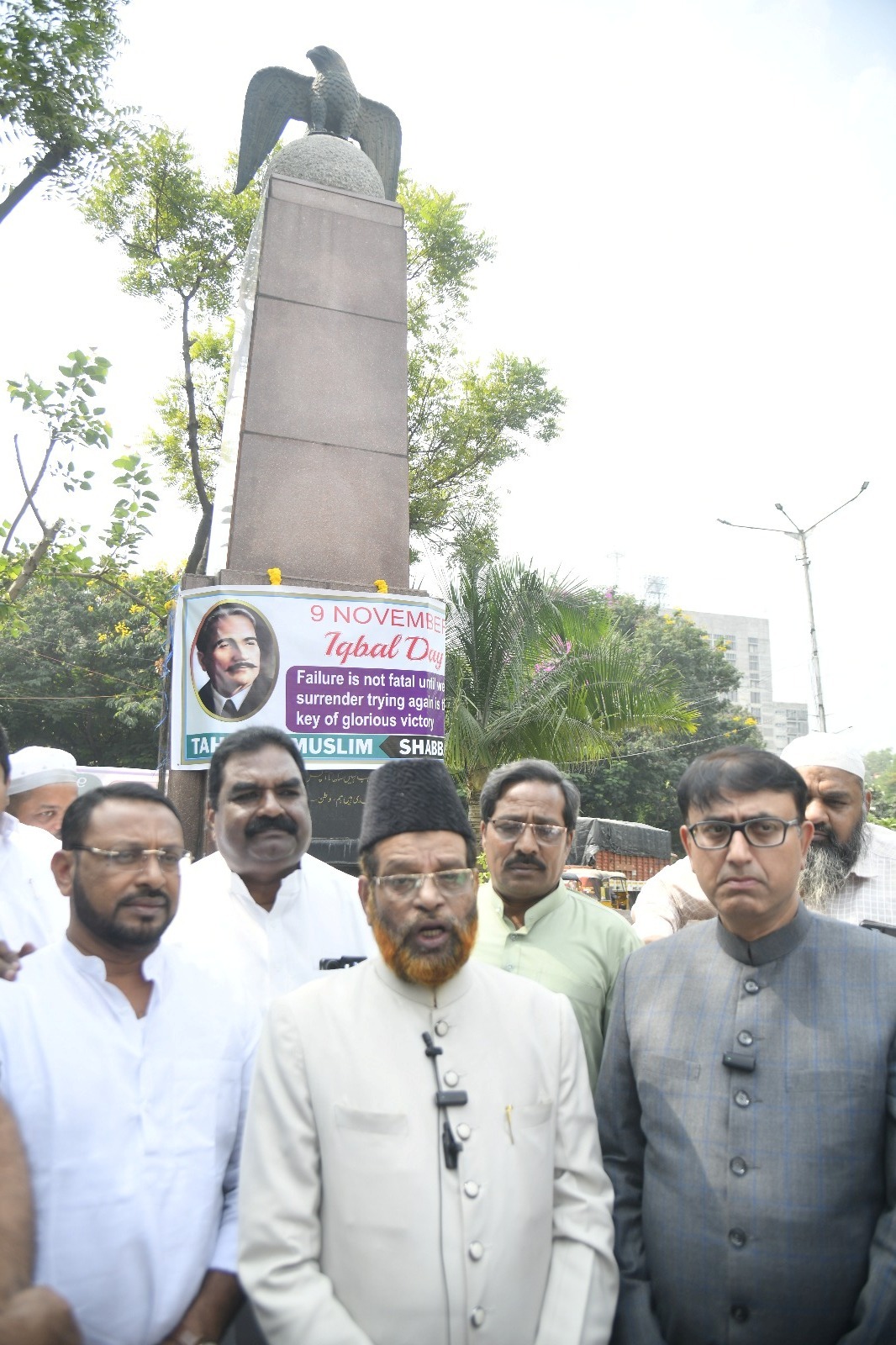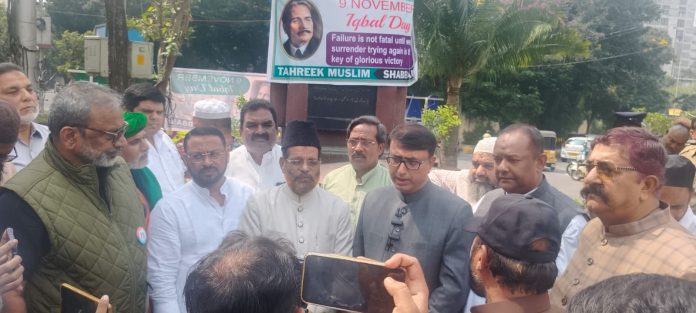Hyderabad: Representatives of various Muslim organisations gathered at Iqbal Minar here today to pay rich tributes to eminent poet and philosopher Muhammad Iqbal on his 147th birth anniversary.
Celebrating ‘Iqbal Day’, they urged the Telangana government to officially celebrate birth and death anniversaries of Iqbal, who was popular as Shayer-e-Mashriq (Poet of the East).
Mohammed Abdul Aziz, president, Movement for Peace and Justice (MPJ); Mohammed Mushtaq Malik, president, Tehreek-e-Muslim Shabban; Amjed Ullah Khan, spokesman, Majlis Bachao Tehreek (MBT); Telangana Pradesh Congress Committee spokesman Syed Nizamuddin, Bharat Rashtra Samithi (BRS) leader Raheem Ullah Khan Niyazi, Indian Union Muslim League state president Mohammed Shakeel and others gathered at Iqbal Minar, located near Telangana state Secretariat.
 Iqbal Minar was inaugurated on April 21, 1988 on the occasion of Allama Iqbal’s 50th death anniversary.
Iqbal Minar was inaugurated on April 21, 1988 on the occasion of Allama Iqbal’s 50th death anniversary.
Abdul Aziz said that every poem and ‘khutba’ of Allama Iqbal still guides the Islamic community. He stressed the need to spread the message of Iqbal.
“There is no Prime Minister of India since 1947 till today who has not read this couplet of Iqbal. Mazhab nahi sikhata aapas mein bair rakhna. Hindi hain hum watan hain Hindustan hamara,” he said.
He hailed celebration of Iqbal Day, saying conscious nations don’t forget their patrons.
Mushtaq Malik said this was the first such gathering at Iqbal Minar since the memorial was built in 1988 by then government of Telugu Desam Party (TDP) headed by N.T. Rama Rao.
He recalled that in 1988 Iqbal Academy had organised a three-day international seminar on Iqbal in Hyderabad. Poets, authors, scholars from different parts of the world had attended the seminar inaugurated by then Chief Minister NTR.
It was due to the efforts of Syed Khaleelullah Hussaini, president of Iqbal Academy and Abid Ali Khan, founder editor, Siasat, that Iqbal Minar was built in memory of Allama Iqbal, he said.
Born on November 9, 1877, in Sialkot, Punjab (now in Pakistan), Allama Iqbal is remembered for his immense contributions to poetry, philosophy, and the intellectual awakening of South Asia. His legacy continues to inspire people across generations and regions, from India to Pakistan and beyond.
The significance of Iqbal’s contributions to literature, philosophy, and the spirit of unity was highlighted by the leaders.
Paying his tributes, Syed Nizamuddin stated that Iqbal’s creative legacy endures even 86 years after his passing, with his words continuing to inspire millions around the world. He said Iqbal’s vision for cultural and intellectual unity resonates strongly in contemporary society. He also cited some of Iqbal’s most renowned works, including Sare Jahan Se Acha, Shikwa, and Jawab-e-Shikwa, as symbols of cultural pride and intellectual richness.
“Allama Iqbal was one of the brightest lights among the great thinkers of the 20th century. This great poet was also a philosopher and visionary who inspired movements for freedom and self-reliance across South Asia. Iqbal’s call for spiritual and cultural awakening urged generations to seek knowledge and introspection, and many regard him as a guiding light for reform and progress,” Syed Nizamuddin said.
Amjedullah Khan emphasised the enduring relevance of Iqbal’s poetry, especially for the younger generation, and noted that his works infuse a sense of pride in cultural heritage. He highlighted Sare Jahan Se Acha as a lasting anthem of unity and resilience, further cementing Iqbal’s place in history.
The visit by the Muslim leaders to Iqbal Minar also highlighted the late poet’s connect with Hyderabad.
He had first visited Hyderabad in 1910. As the guest of Maharaja Kishen Pershad, the then Prime Minister of Hyderabad, he visited the Qutb Shahi tombs. According to senior journalist J. S. Ifthekhar, the full moon night and the serene ambience of the royal necropolis had such an effect on him that he penned the famous poem Goristan-e-Shahi right there. The 116-line nazm depicts in detail the helplessness of man, the inevitability of death, and rise and fall of kingdoms.
Allama Iqbal made two more visits to Hyderabad and delivered extensive lectures on ‘Reconstruction of Religious Thought in Islam’ at the Town Hall, the present Assembly building.
The first ‘Iqbal Day’ was observed in Hyderabad on January 7, 1938, in the lifetime of the poet. Also, ‘Bazm-e-Iqbal’, the first organisation in the name of the celebrated poet, was set up here. The city also takes the credit for publishing a collection of his early poems for the first time. In 2010, the Iqbal Academy celebrated ‘Jashn-e-Iqbal’ to commemorate the historical trip of the poet to the city. Eminent scholars held forth on the poet’s all-time relevance and his message of humanism.
A recipient of many honorary doctorates, Iqbal was also honoured with a DLitt by the Osmania University in 1938. A letter written by Iqbal in his own hand addressed to Mahraja Kishen Pershad, is preserved in the Idara-e-Adabiyat-e-Urdu, the institution founded by Syed Mohinuddin Qadri Zore, for promotion of Urdu.




